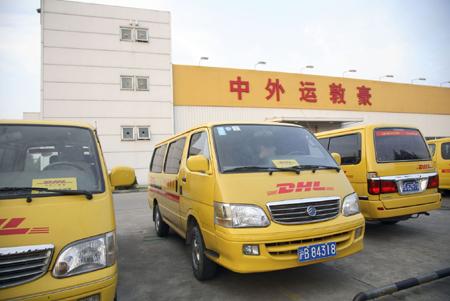
Delivery vans are parked at a DHL sorting facility near Pudong Airport in Shanghai. The logistics company believes that increasing infrastructure investments, reducing administrative costs and establishing logistics standards can lead to greater efficiency in the industry. [Photo/Bloomberg]
TOKYO - Emerging economies can reduce logistics costs by 30 percent, shorten transit time by 65 percent and gain 20 percent to 40 percent more trade by 2020 if more efficient logistics practices are applied, an executive of leading logistics company Deutsche Post DHL said on Wednesday.The logistics company has identified three key approaches, which urge governments and regulators to decrease administrative burdens, reform customs and security processes, and focus on infrastructure investment, to help emerging economies improve their logistics efficiency.
"World trade as a percentage of GDP has increased from a third to more than 50 percent over the past 30 years. However, inefficient logistics in many economies are still a roadblock to trade growth," said Hermann Ude, chief executive officer of DHL Global Forwarding division.
For example, BRIC countries - Brazil, Russia, India and China - on average require twice as many export or import documents versus "best-in-class" countries such as Singapore and Germany, according to DHL.
"High paperwork requirements post a challenge that pushes complexity in logistics procedures and administration can be the most time consuming element in the life of a shipment," Ude said.
In terms of customs and security, BRIC countries carry out 10 times more physical cargo inspections than best-in-class countries, without notable improvements in security, DHL reported.
"Increasing security levels via process controls is the optimal solution and aligning standards globally will be beneficial both in increasing security and in reducing costs," Ude said.
 Real estate sector shows signs of cooling
Real estate sector shows signs of coolingInfrastructure investments in key areas such as strategic ports and interlinked road and railway systems are also needed if costs are to remain competitive with growth maintained, DHL reported.
"Infrastructure bottlenecks or sub-standard transport facilities can force logistics companies such as DHL to use sub-optimal routes in order to guarantee delivery and this increases costs," Ude said.
Kelvin Leung, DHL Global Forwarding CEO for North Asia Pacific, told China Daily that security processes and infrastructure investment are not the key problems for China as the country has been extremely proactive in infrastructure.
However, because logistics standards and procedures widely vary from one area to another in China, the most serious problem for the country to address is decreasing the administrative burden.
"If there is more harmonization of trade standards and processes among different local governments across the whole of China, all companies, both local and international, can benefit," Leung said.




